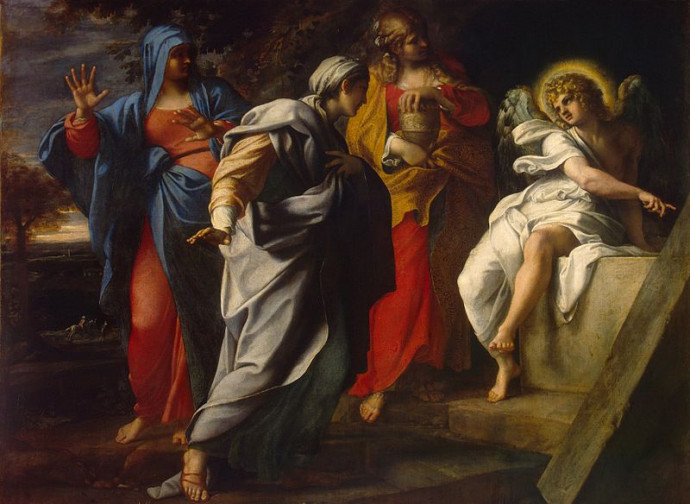Easter Monday
For the liturgy of the Church, today is Monday in the Octave of Easter. Traditionally it recalls what happened at the tomb the previous day, on the Sunday morning when the pious women - Mary Magdalene, Salome and Mary mother of James - went to the tomb with the intention of anointing Jesus' body with aromatic oils.

For the liturgy of the Church, today is Monday in the Octave of Easter.
Traditionally it recalls what happened at the tomb the previous day, on the Sunday morning (the first day of the week in the Jewish calendar, therefore the first day after Passover), when the pious women - Mary Magdalene, Salome and Mary mother of James - went to the tomb with the intention of anointing Jesus' body with aromatic oils. When they arrived at the tomb, they found the large boulder that had closed it rolled away. Their astonishment and trembling grew when an angel appeared to them in dazzling robes; he took care to reassure them and gave them the joyful announcement: “Do not be alarmed. You are looking for Jesus the Nazarene, who was crucified. He is risen! He is not here. Look, there is the place where they laid him. But hurry; tell his disciples, that he is going ahead of you into Galilee. You will see him there, just as he told you” (Mk 16:1-7).
«Today is the second day of the Octave of Easter. Yesterday was the solemnity of Easter, today is Easter Monday. In Italy there is the lovely tradition of calling this day Pasquetta [Little Easter], but I don't want to talk about Pasquetta. There is also another name for this day: the day or the feast “of the Angel”». These were the words of John Paul II during the Regina Coeli on 1 April 1991, adding: “This is a very beautiful tradition that deeply connects to the biblical sources on the Resurrection. We remember the narration of the Synoptic Gospels, when women go to the Sepulchre and find it open. They had feared that they could not enter because the tomb was closed by a large stone. Instead it is open and, from the inside, they hear the words: “Jesus Nazarene is not here”. For the first time the words: “He is risen” were spoken. The evangelists tell us that these words were spoken by the Angels”.
According to the Polish saint, “there is a profound meaning in this angelic presence and in this angelic proclamation: just as the proclamation of the Incarnation of the Word, Son of God, could only have been by an Angel, Gabriel, so also for the first uttering of the words “He is risen”, the Resurrection, a human subject was not enough, human words were not adequate. It took a superior being, because for the human being this truth and the words that communicate the truth, “He is risen”, this truth itself is so shocking, so incredible, that perhaps no man would have dared pronounce it”.
John Paul II added: “After this first announcement we begin to repeat: “The Lord is risen and revealed himself to Peter, to Simon”, but the first announcement required an intelligence superior to human intelligence. So this feast of the Angel, at least as I understand it, is a completion of the Easter Octave. In the biblical readings, in the passages of the Gospels one always reads about these Angels, but the Italian name of the feast day underlines the moment of this angelic presence, not only underlines it, but also explains the reason for this moment of the Resurrection. Above the human observation that the tomb was empty, another, superhuman observation was needed: “He is risen”.
